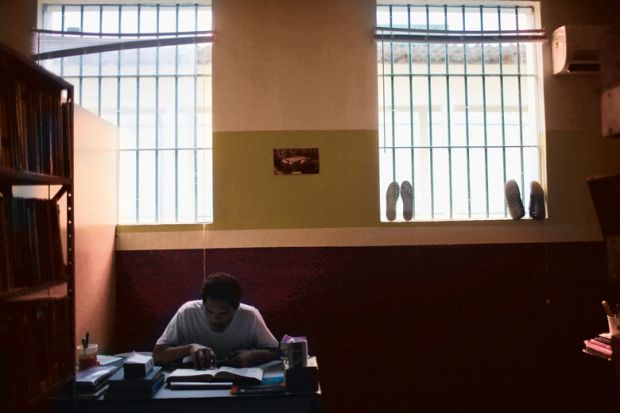When you think about policy for a living, you occasionally come across something so unfair, so memorable and so easy to fix that it seems absurd to ignore it. The rule that bars prisoners on long sentences from higher education in England and Wales is one clear example.
Serious criminals imprisoned for long stretches cannot take out a student loan unless they are within six years of release. Why? It seems to be an overhang from the expectation that part-time students will start repaying their loans six years after their course begins. As long-term prisoners cannot repay within that timeframe, they are banned from taking a loan out in the first place.
It beggars belief that anyone who believes in the transformative power of education could approve of this rule. After all, education can be just as transformative for those who have succumbed to the worst sorts of criminal activity too. In particular, it can make prisoners better role models and reduce reoffending rates – saving taxpayers the £40,000 annual cost of keeping someone in prison and reducing the crime that blights lives. That is a win–win.
However, when the policy on part-time students was adopted back in 2012, neither prisons nor prisoners were a major part of the conversation. It is that old problem about lack of joined-up government. Rory Stewart, the former prisons minister and now London mayoral candidate, responded to a report released last month on prisoner education by the Higher Education Policy Institute and the Open University by tweeting: “Prisoners should be able to pursue degrees. There is far more support for this in the [US]. In England and Wales they are caught in a bizarre stand-off with HE funding.”
Another reason why the rules have not yet changed is politicians’ fear of negative media headlines about being soft on crime. No one believes that prisoners on long sentences should enjoy the life of Riley and a change to the rules could be misconstrued as excessive generosity. But there are two options: leave prisoners to stew or give them opportunities to better themselves. The first creates more disruptive inmates while the second boosts personal fulfilment and makes it easier for people to sustain honest lives when they are released.
Third, long-standing arguments about whether prison should be primarily about punishment or rehabilitation go back and forth endlessly. This is partly because it is not a simple left/right or Tory/Labour split. The right-wing Conservative Chris Grayling severely restricted the receipt of books through the post by prisoners when he was justice secretary; his successor, the right-wing Conservative Michael Gove, reversed that policy. Some robust right-wing politicians favour prisoner education; some liberal left-wing ones want to burnish their law and order credentials.
Hopefully, the political parties will find room in their Brexit-obsessed election manifestos to slip in some positive words about prisoner education. But there are things that universities can do too, particularly in relation to recently released prisoners.
For too long, having a criminal record has been a big barrier against taking a degree. In a recent interview with The Times, Michaella McCollum, who was imprisoned in 2013 in Peru for drug smuggling, revealed that the UK university she subsequently attended in an attempt to move her life forward “discovered her conviction and threw her out”.
Although we do not know all the details of this particular case, the story reminded me of my time at university, over 30 years ago. A mature student was thrown off our course because the institution discovered he was guilty of an ancient and relatively minor drugs offence.
The decision seemed unfair then and still does. It is possible to simultaneously disapprove of both the offence and the university’s extra punishment. Above all, it was not at all clear who benefited from the decision to throw him out. It made little difference to the university, but it put paid to the career ambitions of the student.
The current situation can deter people with criminal convictions from applying to university in the first place, cause problems at the application stage and make life harder for former prisoners after enrolment. Given the Open University’s extensive work with prisoners, this may even be one of those areas where other UK universities regard the OU’s work as the sector’s safety valve, meaning they feel they can pay less attention to the issue.
But things are getting better. Ucas, the admissions service, recently removed the box that required every university applicant to identify “relevant unspent convictions”. And the charity Unlock, with support from the UPP Foundation, has come up with “the fair chance pledge”, whose commitments include asking applicants about criminal records only when necessary, ensuring staff are trained to make fair and impartial judgements and helping students with criminal records to achieve academic success. So far, a dozen UK higher education institutions have signed up.
Care-leavers, people from low-income households and those from some ethnic groups are disproportionately likely to be imprisoned, so a new approach should also be a key plank in the sector’s approach to widening participation.
And, after the past few years of national division, it is surely time to embrace any measure that provides opportunities for a greater number of people to contribute to building a more cohesive society – especially if you can reduce reoffending and save money at the same time.
Nick Hillman is director of the Higher Education Policy Institute.
POSTSCRIPT:
Print headline: Give offenders a fair chance
Register to continue
Why register?
- Registration is free and only takes a moment
- Once registered, you can read 3 articles a month
- Sign up for our newsletter
Subscribe
Or subscribe for unlimited access to:
- Unlimited access to news, views, insights & reviews
- Digital editions
- Digital access to THE’s university and college rankings analysis
Already registered or a current subscriber? Login








